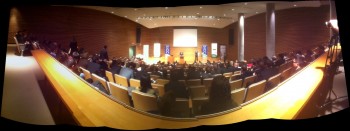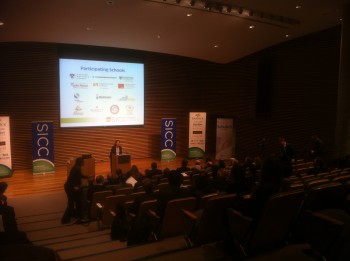SFU Beedie School of Business team: Scott Gage, Matthew Harris, Dave Crozier and Lindsay McIvor
SFU’s Beedie School of Business was honoured by the invitation to Schulich’s inaugural Case Competition on Sustainability in the Mining Sector and was thrilled at the opportunity to engage with this increasingly pressing issue. The team of four was assembled about a month out from the competition, with Scott, Dave and Matt having had experience in the mining sector, and Lindsay’s education being in the field of Sustainability. With two representatives from the 2010 MBA cohort and two from the 2011 MBA cohort, the team enjoyed the opportunity to get to know each other and to reconcile our visions for the case.
As soon as we got together we started to reach out to the Mining community in Vancouver, with the help of Stephanie Bertels, who acted as our “coach” during the preparation period. The team received the case two weeks out from the competition and it entailed a property in Papua New Guinea which is owned by Barrick Gold, who was the main sponsor of the competition. This particular property was acquired in 2006 as part of a bundle acquisition of 12 properties in total. The problem is, the property came with serious “legacy issues” such as human rights infractions and a method of tailings disposal which entails dumping the tailings directly into the river system – something that has been outlawed at all but two mines in the world due to the real and perceived environmental impacts of the practice. The construction of a conventional tailings pond at the site has been deemed unsafe as a result of the highly unstable geographical characteristics of the region. While this mine is proving very profitable for Barrick, there has been some backlash from the investing community attributable to the perception that the company’s ownership of the property is not up to international ethical standards. The questions posed in the case asked how mining companies can factor into their acquisition model the risks and rewards of sustainability issues, and upon acquisition, how can mining firms ensure that their corporate sustainability values and policies are effectively integrated into the acquired operation?
The issues at hand and the questions put forth in the case are incredibly complex, challenging, and relevant to the problems which the industry as a whole is increasingly faced with. The overwhelming participation of key industry actors as judges – including dozens of CEOs and other high level executives from some of the world’s largest mining companies – was impressive and demonstrated the serious tone which the industry is taking in regard to sustainability issues in mining. While we did not finalize at the competition, working on the case and engaging with these issues has been one of the most rewarding experiences of the program. The team would like to take this opportunity to thank SFU’s Beedie School of Business for fully supporting our participation in the Schulich International Case Competition and to sincerely thank Stephanie Bertels for her dedicated assistance to the team.
All the Best,
Lindsay McIvor

